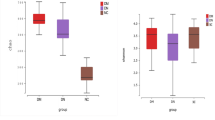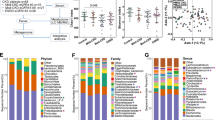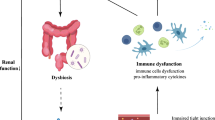Abstract
Purpose
Multiple factors, such as dietary patterns, pharmaceutical interventions, and exposure to harmful substances, possess the capacity to influence gut microbiota composition. Gut microbiota dysbiosis has emerged as a significant contributor to the progression of chronic kidney disease (CKD) and its associated complications. By comprehending the intricacies of the intestinal microbiota, this research endeavor holds the potential to offer novel perspectives on potential strategies for mitigating CKD progression.
Methods
In this retrospective analysis, we assessed gut microbiota composition in CKD patients. Fecal samples were collected from a cohort of 44 patients with stage 3–4 CKD, alongside a control group consisting of 132 healthy volunteers. Subsequently, 16 s rDNA sequencing was conducted to examine the composition of the gut microbiota.
Results
Our findings revealed significant alterations in the diversity of intestinal microbiota in fecal samples between patients with stage 3–4 CKD and healthy subjects. Among the 475 bacterial genera, 164 were shared, while 242 dominant genera were exclusive to healthy subjects and 69 to CKD stages 3–4 samples. Notably, healthy volunteers exhibited a prevalence of intestinal Firmicutes and Bacteroidetes, whereas stage 3–4 CKD patients displayed higher abundance of Proteobacteria and Actinobacteria. The presence of uncultured Coprobacillus sp. notably contributed to distinguishing between the two groups. ROC curve analysis identified distinct microbiota with superior diagnostic efficacy for discriminating stage 3–4 CKD patients from healthy individuals. Metabolic pathway analysis revealed differing dominant pathways between the two groups—the NADH dehydrogenase pathway in healthy individuals and the phosphate acetyltransferase pathway in stage 3–4 CKD patients. Moreover, the CKD cohort displayed a higher proportion of Gram-negative bacteria and facultative anaerobes.
Conclusions
In conclusion, our study underscores the profound influence of gut microbiota dysbiosis on CKD progression. The distinct microbial profiles observed in CKD patients highlight the potential efficacy of microbiota-based interventions in mitigating CKD advancement.






Similar content being viewed by others
Data availability
All data presented in this study are available from the corresponding author upon reasonable request.
References
Yang C, Wang H, Zhao X, Matsushita K, Coresh J, Zhang L, Zhao MH (2020) CKD in China: evolving spectrum and public health implications. Am J Kidney Dis 76:258–264. https://doi.org/10.1053/j.ajkd.2019.05.032
Chen TK, Knicely DH, Grams ME (2019) Chronic kidney disease diagnosis and management: a review. JAMA 322:1294–1304. https://doi.org/10.1001/jama.2019.14745
Webster AC, Nagler EV, Morton RL, Masson P (2017) Chronic kidney disease. Lancet (London, England) 389:1238–1252. https://doi.org/10.1016/s0140-6736(16)32064-5
Hill NR, Fatoba ST, Oke JL, Hirst JA, O’Callaghan CA, Lasserson DS, Hobbs FD (2016) Global prevalence of chronic kidney disease—a systematic review and meta-analysis. PLoS ONE 11:e0158765. https://doi.org/10.1371/journal.pone.0158765
Levin A, Stevens PE, Bilous RW, Coresh J, De Francisco AL, De Jong PE, Griffith KE, Hemmelgarn BR, Iseki K, Lamb EJ (2013) Kidney Disease: Improving Global Outcomes (KDIGO) CKD Work Group. KDIGO 2012 clinical practice guideline for the evaluation and management of chronic kidney disease. Kidney int Suppl 3:1–150
Stevens PE, Levin A (2013) Evaluation and management of chronic kidney disease: synopsis of the kidney disease: improving global outcomes 2012 clinical practice guideline. Ann Intern Med 158:825–830. https://doi.org/10.7326/0003-4819-158-11-201306040-00007
Ammirati AL (2020) Chronic kidney disease. Rev Assoc Med Bras 66(1):03–09. https://doi.org/10.1590/1806-9282.66.s1.3
KDOQI Clinical Practice Guideline for Diabetes and CKD (2012) 2012 Update. Am J Kidney Dis 60:850–886. https://doi.org/10.1053/j.ajkd.2012.07.005
Nallu A, Sharma S, Ramezani A, Muralidharan J, Raj D (2017) Gut microbiome in chronic kidney disease: challenges and opportunities. Transl Res 179:24–37. https://doi.org/10.1016/j.trsl.2016.04.007
Cresci GA, Bawden E (2015) Gut microbiome: what we do and don’t know. Nut in Clin Prac 30:734–746. https://doi.org/10.1177/0884533615609899
Heintz-Buschart A, Wilmes P (2018) Human gut microbiome: function matters. Trends Microbiol 26:563–574. https://doi.org/10.1016/j.tim.2017.11.002
Kasubuchi M, Hasegawa S, Hiramatsu T, Ichimura A, Kimura I (2015) Dietary gut microbial metabolites, short-chain fatty acids, and host metabolic regulation. Nutrients 7:2839–2849. https://doi.org/10.3390/nu7042839
Ikeda T, Nishida A, Yamano M, Kimura I (2022) Short-chain fatty acid receptors and gut microbiota as therapeutic targets in metabolic, immune, and neurological diseases. Pharmacol Ther 239:108273. https://doi.org/10.1016/j.pharmthera.2022.108273
Schmidt TSB, Raes J, Bork P (2018) The human gut microbiome: from association to modulation. Cell 172:1198–1215. https://doi.org/10.1016/j.cell.2018.02.044
Guven G, Hilty MP, Ince C (2020) Microcirculation: physiology, pathophysiology, and clinical application. Blood Purif 49:143–150. https://doi.org/10.1159/000503775
Vasylyeva TL, Singh R (2016) Gut microbiome and kidney disease in pediatrics: does connection exist? Front Microbiol 7:235. https://doi.org/10.3389/fmicb.2016.00235
Muskiet MH, Smits MM, Morsink LM, Diamant M (2014) The gut-renal axis: do incretin-based agents confer renoprotection in diabetes? Nat Rev Nephrol 10:88–103. https://doi.org/10.1038/nrneph.2013.272
Evenepoel P, Poesen R, Meijers B (2017) The gut-kidney axis. Pediatric Nephrol (Berlin, Germany) 32:2005–2014. https://doi.org/10.1007/s00467-016-3527-x
Yang T, Richards EM, Pepine CJ, Raizada MK (2018) The gut microbiota and the brain-gut-kidney axis in hypertension and chronic kidney disease. Nat Rev Nephrol 14:442–456. https://doi.org/10.1038/s41581-018-0018-2
Shi N, Li N, Duan X, Niu H (2017) Interaction between the gut microbiome and mucosal immune system. Mil Med Res 4:14. https://doi.org/10.1186/s40779-017-0122-9
Lohia S, Vlahou A, Zoidakis J (2022) Microbiome in chronic kidney disease (CKD): an omics perspective. Toxins. https://doi.org/10.3390/toxins14030176
Plata C, Cruz C, Cervantes LG, Ramírez V (2019) The gut microbiota and its relationship with chronic kidney disease. Int Urol Nephrol 51:2209–2226. https://doi.org/10.1007/s11255-019-02291-2
Stedman A, Nigro G, Sansonetti PJ (2016) Microbiota-intestinal stem cells dialog: a key element for intestinal regeneration. Med Sci 32:983–990. https://doi.org/10.1051/medsci/20163211014
Fakhoury HMA, Kvietys PR, AlKattan W, Anouti FA, Elahi MA, Karras SN, Grant WB (2020) Vitamin D and intestinal homeostasis: Barrier, microbiota, and immune modulation. J Steroid Biochem Mol Biol 200:105663. https://doi.org/10.1016/j.jsbmb.2020.105663
Wang X, Yang S, Li S, Zhao L, Hao Y, Qin J, Zhang L, Zhang C, Bian W, Zuo L et al (2020) Aberrant gut microbiota alters host metabolome and impacts renal failure in humans and rodents. Gut 69:2131–2142. https://doi.org/10.1136/gutjnl-2019-319766
Liu JR, Miao H, Deng DQ, Vaziri ND, Li P, Zhao YY (2021) Gut microbiota-derived tryptophan metabolism mediates renal fibrosis by aryl hydrocarbon receptor signaling activation. Cell Mol Life Sci CMLS 78:909–922. https://doi.org/10.1007/s00018-020-03645-1
Ward T, Larson J, Meulemans J, Hillmann B, Lynch J, Sidiropoulos D, Spear J, Caporaso G, Blekhman R, Knight R (2017) BugBase predicts organism level microbiome phenotypes. Genome Biol 62:1479
Al Bander Z, Nitert MD, Mousa A, Naderpoor N (2020) The gut microbiota and inflammation: an overview. Int J Environ Res Public Health. https://doi.org/10.3390/ijerph17207618
Virtue AT, McCright SJ, Wright JM, Jimenez MT, Mowel WK, Kotzin JJ, Joannas L, Basavappa MG, Spencer SP, Clark ML et al (2019) The gut microbiota regulates white adipose tissue inflammation and obesity via a family of microRNAs. Sci Transl Med. https://doi.org/10.1126/scitranslmed.aav1892
Mahmoodpoor F, Rahbar Saadat Y, Barzegari A, Ardalan M, Zununi Vahed S (2017) The impact of gut microbiota on kidney function and pathogenesis. Biomed Pharm 93:412–419. https://doi.org/10.1016/j.biopha.2017.06.066
Hobby GP, Karaduta O, Dusio GF, Singh M, Zybailov BL, Arthur JM (2019) Chronic kidney disease and the gut microbiome. Am J Physiol Renal Physiol 316:F1211-f1217. https://doi.org/10.1152/ajprenal.00298.2018
Chaves LD, McSkimming DI, Bryniarski MA, Honan AM, Abyad S, Thomas SA, Wells S, Buck M, Sun Y, Genco RJ et al (2018) Chronic kidney disease, uremic milieu, and its effects on gut bacterial microbiota dysbiosis. Am J Physiol Renal Physiol 315:F487-f502. https://doi.org/10.1152/ajprenal.00092.2018
Wong J, Piceno YM, DeSantis TZ, Pahl M, Andersen GL, Vaziri ND (2014) Expansion of urease- and uricase-containing, indole- and p-cresol-forming and contraction of short-chain fatty acid-producing intestinal microbiota in ESRD. Am J Nephrol 39:230–237. https://doi.org/10.1159/000360010
Vaziri ND, Wong J, Pahl M, Piceno YM, Yuan J, DeSantis TZ, Ni Z, Nguyen TH, Andersen GL (2013) Chronic kidney disease alters intestinal microbial flora. Kidney Int 83:308–315. https://doi.org/10.1038/ki.2012.345
Yasuda G, Shibata K, Takizawa T, Ikeda Y, Tokita Y, Umemura S, Tochikubo O (2002) Prevalence of constipation in continuous ambulatory peritoneal dialysis patients and comparison with hemodialysis patients. Am J Kidney Dis 39:1292–1299. https://doi.org/10.1053/ajkd.2002.33407
Gibiino G, Lopetuso LR, Scaldaferri F, Rizzatti G, Binda C, Gasbarrini A (2018) Exploring bacteroidetes: metabolic key points and immunological tricks of our gut commensals. Dig Liver Dis 50:635–639. https://doi.org/10.1016/j.dld.2018.03.016
Wu R, Ruan XL, Ruan DD, Zhang JH, Wang HL, Zeng QZ, Lu T, Gan YM, Luo JW, Wu JB (2021) Differences in gut microbiota structure in patients with stages 4–5 chronic kidney disease. Am J Transl Res 13:10056–10074
Zhu H, Cao C, Wu Z, Zhang H, Sun Z, Wang M, Xu H, Zhao Z, Wang Y, Pei G et al (2021) The probiotic L. casei Zhang slows the progression of acute and chronic kidney disease. Cell Metab. https://doi.org/10.1016/j.cmet.2021.06.014
Pavan M (2016) Influence of prebiotic and probiotic supplementation on the progression of chronic kidney disease. Min Urol Nefrol Ital J Urol Nephrol 68:222–226
Huang H, Li K, Lee Y, Chen M (2021) Preventive effects of lactobacillus mixture against chronic kidney disease progression through enhancement of beneficial bacteria and downregulation of gut-derived uremic toxins. J Agric Food Chem 69:7353–7366. https://doi.org/10.1021/acs.jafc.1c01547
Sorbara MT, Pamer EG (2022) Microbiome-based therapeutics. Nat Rev Microbiol 20:365–380. https://doi.org/10.1038/s41579-021-00667-9
Sharma A, Das P, Buschmann M, Gilbert JA (2020) The future of microbiome-based therapeutics in clinical applications. Clin Pharmacol Ther 107:123–128. https://doi.org/10.1002/cpt.1677
Barba C, Soulage CO, Caggiano G, Glorieux G, Fouque D, Koppe L (2020) Effects of fecal microbiota transplantation on composition in mice with CKD. Toxins. https://doi.org/10.3390/toxins12120741
Feng YL, Cao G, Chen DQ, Vaziri ND, Chen L, Zhang J, Wang M, Guo Y, Zhao YY (2019) Microbiome-metabolomics reveals gut microbiota associated with glycine-conjugated metabolites and polyamine metabolism in chronic kidney disease. Cell Mol Life Sci 76:4961–4978. https://doi.org/10.1007/s00018-019-03155-9
Ozkok A, Elcioglu OC, Cukadar T, Bakan A, Sasak G, Atilgan KG, Alisir S, Kanbay M, Covic A, Odabas AR (2013) Low serum pancreatic enzyme levels predict mortality and are associated with malnutrition-inflammation-atherosclerosis syndrome in patients with chronic kidney disease. Int Urol Nephrol 45:477–484. https://doi.org/10.1007/s11255-012-0237-6
Matsushita K, Ballew SH, Wang AY, Kalyesubula R, Schaeffner E, Agarwal R (2022) Epidemiology and risk of cardiovascular disease in populations with chronic kidney disease. Nat Rev Nephrol 18:696–707. https://doi.org/10.1038/s41581-022-00616-6
Patel N, Yaqoob MM, Aksentijevic D (2022) Cardiac metabolic remodelling in chronic kidney disease. Nat Rev Nephrol 18:524–537. https://doi.org/10.1038/s41581-022-00576-x
Speer T, Dimmeler S, Schunk SJ, Fliser D, Ridker PM (2022) Targeting innate immunity-driven inflammation in CKD and cardiovascular disease. Nat Rev Nephrol 18:762–778. https://doi.org/10.1038/s41581-022-00621-9
Kadatane SP, Satariano M, Massey M, Mongan K, Raina R (2023) The role of inflammation in CKD. Cells. https://doi.org/10.3390/cells12121581
Wu GD, Chen J, Hoffmann C, Bittinger K, Chen YY, Keilbaugh SA, Bewtra M, Knights D, Walters WA, Knight R et al (2011) Linking long-term dietary patterns with gut microbial enterotypes. Science 334:105–108. https://doi.org/10.1126/science.1208344
Su G, Qin X, Yang C, Sabatino A, Kelly JT, Avesani CM, Carrero JJ (2022) Fiber intake and health in people with chronic kidney disease. Clin Kidney J 15:213–225. https://doi.org/10.1093/ckj/sfab169
Favero C, Carriazo S, Cuarental L, Fernandez-Prado R, Gomá-Garcés E, Perez-Gomez MV, Ortiz A, Fernandez-Fernandez B, Sanchez-Niño MD (2021) Phosphate, microbiota and CKD. Nutrients. https://doi.org/10.3390/nu13041273
Naber T, Purohit S (2021) Chronic kidney disease: role of diet for a reduction in the severity of the disease. Nutrients. https://doi.org/10.3390/nu13093277
Meléndez Oliva E, Villafañe JH, Alonso Pérez JL, Alonso Sal A, Molinero Carlier G, Quevedo García A, Turroni S, Martínez-Pozas O, Valcárcel Izquierdo N, Sánchez Romero EA (2022) Effect of exercise on inflammation in hemodialysis patients: a systematic review. J Personal Med. https://doi.org/10.3390/jpm12071188
Suzuki K (2019) Chronic inflammation as an immunological abnormality and effectiveness of exercise. Biomolecules. https://doi.org/10.3390/biom9060223
Wegierska AE, Charitos IA, Topi S, Potenza MA, Montagnani M, Santacroce L (2022) The connection between physical exercise and gut microbiota: implications for competitive sports athletes. Sports Med 52:2355–2369. https://doi.org/10.1007/s40279-022-01696-x
König RS, Albrich WC, Kahlert CR, Bahr LS, Löber U, Vernazza P, Scheibenbogen C, Forslund SK (2021) The gut microbiome in myalgic encephalomyelitis (ME)/chronic fatigue syndrome (CFS). Front Immunol 12:628741. https://doi.org/10.3389/fimmu.2021.628741
Li F, Wang M, Wang J, Li R, Zhang Y (2019) Alterations to the gut microbiota and their correlation with inflammatory factors in chronic kidney disease. Front Cell Infect Microbiol 9:206. https://doi.org/10.3389/fcimb.2019.00206
Funding
This work was supported by Youth Natural Science Foundation of Jiangxi Province (Grant No. 20171BAB215011), Foundation of Zhaoyang Talent Plan of Shanghai East Hospital (Grant No. DFZY-6) and Youth Research Development Foundation of The First Affiliated Hospital of Xiamen University (XYY2017021).
Author information
Authors and Affiliations
Contributions
HT, JX, ML, XY, and SC: conceptualization, methodology, supervision, and revision. XY, and SC: original draft preparation. XY, SC, JG, JZ, ML, RC, LZ, PB, BL, and MZ: investigation and visualization. All the authors contributed to the article and approved the submitted version.
Corresponding authors
Ethics declarations
Conflict of interest
The authors declare that there is no conflict of interest regarding the publication of this paper.
Ethical approval
The study was conducted in accordance with the Declaration of Helsinki, and approved by the Ethics Committee of First Affiliated Hospital of Xiamen University.
Informed consent
Informed consents have been obtained from all the patients involved in this study.
Additional information
Publisher's Note
Springer Nature remains neutral with regard to jurisdictional claims in published maps and institutional affiliations.
Supplementary Information
Below is the link to the electronic supplementary material.
11255_2023_3893_MOESM1_ESM.jpg
Supplementary file1 Supplementary Figure. 1 Relative abundance of gut microbiota in patients with stage 3-4 CKD and healthy controls at class, order, family and genus levels (JPG 945 kb)
Rights and permissions
Springer Nature or its licensor (e.g. a society or other partner) holds exclusive rights to this article under a publishing agreement with the author(s) or other rightsholder(s); author self-archiving of the accepted manuscript version of this article is solely governed by the terms of such publishing agreement and applicable law.
About this article
Cite this article
Yang, X., Cai, S., Gong, J. et al. Characterization of gut microbiota in patients with stage 3–4 chronic kidney disease: a retrospective cohort study. Int Urol Nephrol 56, 1751–1762 (2024). https://doi.org/10.1007/s11255-023-03893-7
Received:
Accepted:
Published:
Issue Date:
DOI: https://doi.org/10.1007/s11255-023-03893-7




